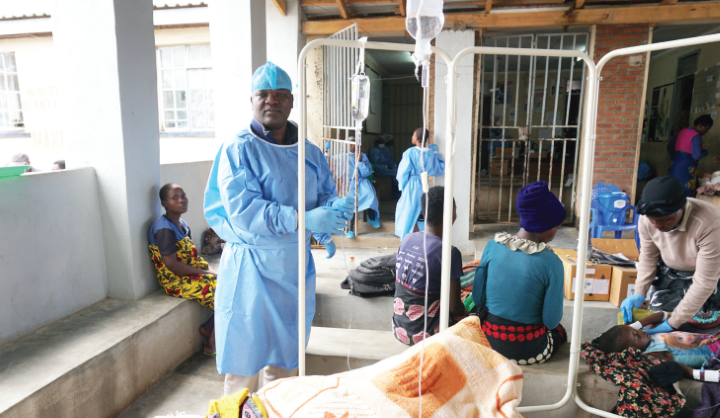Abortion balloons health spending
Malawi’s overwhelmed healthcare system is paying a huge cost to treat deadly complications fuelled by a colonial ban on termination of pregnancy except to save the woman’s life.
Both healthcare workers and activists say scrapping the laws inherited from Britain would reduce public spending on deadly complications of clandestine abortions.

Health experts and activists argue that Malawians are feeling the pangs of swelling health resources expenses due to rising post-abortion care (PAC) needs.
People who clean the wombs of survivors of backstreet abortion say most women and girls arrive in critical condition.
About 38 in 1 000 women of reproductive age procure abortion, according to Ministry of Health spokesperson Adrian Chikumbe. However, most cases occur secretly and go unreported.
Patients at risk of dying from aftermaths of abortion procured outside health facilities arrive with deadly complications, including severe bleeding and rotting wombs, which drain public resources.
Medics say the taxpayer spends an average of K380 000 on such admissions. The cost covers bed, medicines and care, but excludes food.
When it comes to PAC cases, the cost is higher.
Chikumbe says PAC is a huge drain on health resources as doctors sometimes find cassava sticks, herbs, nails and wires in the patient’s private parts.
“These items usually cause holes in the vagina or womb, leading to severe infections that lead to death, injury or disability. This requires intensive care, which is costly,” he says.
According to a 2025 study by reproductive health specialists, PAC costs $13 to $63, but that excludes food. The spending can hit $128 for severe complications, the findings show.
Campaigners say hospitals would spend less and use the savings for underfunded healthcare services if abortion was legal.
Says reproductive health specialist Dr Chisale Mhango: “Certainly, a patient requiring an early abortion would arrive in the hospital in the morning, have the termination done and return home or to work in the afternoon. Her children, partner or employer won’t miss her too much.
“Presently, a doctor is burdened by at least three days caring for a patient with preventable complications.”
The gynaecologist was a lead author of a nationwide study, which shows that at least 141 000 abortions in 2015 were performed by untrained persons outside health facilities.
This confirms that restrictive abortion laws do not stop women from terminating pregnancies.
In 2012, the country’s first woman president Joyce Banda named a special law commission to review abortion laws.
After nationwide consultations, including with custodians of culture and religious leaders, the commissioners proposed to expand the grounds for termination of pregnancy. These include where the pregnancy results from rape, defilement and incest; the foetus is malformed and the woman’s mental and physical health is under threat.
However, the proposed Termination of Pregnancy Bill is stuck in Cabinet secrecy following protests by some religious groups that feel the law reform seeks to legalise abortion on demand, a trend Catholic bishops termed “a culture of death”.
Meanwhile, abortion remains among the top three killers of pregnant women, claiming up to 18 in 100 lives lost to birth-related complications.
“That 500 women still die each year due to unsafe abortion indicates that the current abortion law is not achieving its intended objective. Therefore, it needs to be reformed,” says Mhango, formerly director of the Ministry of Health’s Reproductive Health Unit.
The concealed cases come to light in hospitals where they take approximately two-thirds of beds in gynaecological wards, according to him.
“This is a great cost to the government, yet studies in Malawi show that the cost of safe abortion is just a fraction of post-abortion care,” says Mhango.
He adds: “The hidden costs include the loss of productive work by women seeking post-abortion care and the suffering of those who cannot get the beds taken by patients with abortion-related emergencies.”
Mhango and Chikumbe feel the suggested grounds for safe abortion, which have yet to be tabled for debate in Parliament, would reduce the financial strain on the country’s constrained healthcare budget.
Says Chikumbe. “Abortion pills are cheap and easy to store and dispense at any health facility.
“Women would return to the hospital early in case of anticipated complications; hence, no delays in seeking treatment or the need for hospitalisation.”
However, health workers’ hands are tied by the law abolished by Britain in 1967.
This forces women to resort to backstreet procedures, which endanger their lives.
“It’s alarming that almost 18 percent of maternal deaths in the country are caused by abortions. Public resources spent on post-abortion care should have been used for better health priorities,” says gender activist Emma Kaliya, leader of the Coalition for the Prevention of Unsafe Abortion.
She says the existing law creates a climate of fear of being sentenced to three to 14 years in prison.
National police spokesperson Peter Kalaya says attempts to procure, aid and abate abortion remain criminal offences as stipulated by sections 149 to 151 of the Penal Code.
He says: “Abortion cases are seldom reported to police unless there are complications. Such acts are done secretly.
“When reported to us, we are mandated by law to investigate further and bring the suspects to book.”
This means the police budget is not spared the cost of unsafe abortions.





